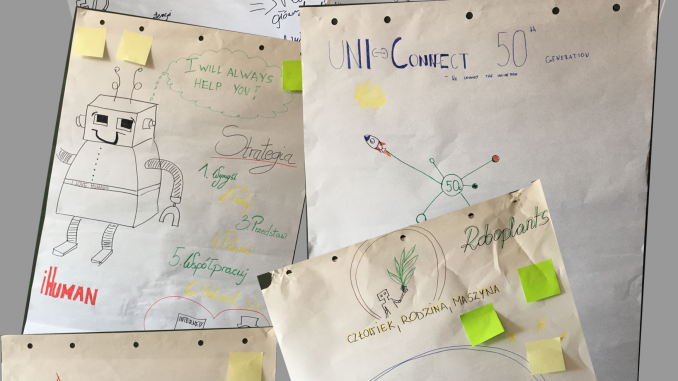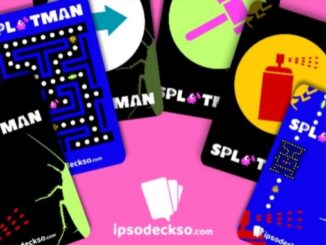
Formal education kills team work. Alright, I hope that got your attention. Now let me share my experience with designing serious games to teach students at the University of Economics Krakow (UEK) 21st Century skills such as communication, leadership and teamwork – and in this way hopefully minimise the impact a constrictive and ill-adjusted education system has on our future generations.
In 2019 I had the exiting opportunity to be part of UEK’s programme The Future of GBS (Global Business Services). Students who signed for, and completed this specialisation, had the chance to learn from industry professionals. Myself and five other professionals from Krakow were trusted with teaching project management.
We were all excited and ready to start cooperating with the minds of the future. We were fortunate in many respects, one of such lucky situations was the ability to create the curricula for this course from scratch. I felt so strongly about this activity that I volunteered to teach four subjects. One more aspect of this collaboration that was particularly exciting, and unexpected for me, was the opportunity to teach my subjects via serious games. I designed, developed and played four games – one for each subject I taught. All the games were simulations of real world scenarios where the students had to form teams and collaborate in order to solve a problem. When explaining these games to the lead lecturer of project management at UEK I referred to these activities as RPS (role playing simulations).
Perhaps now is a good time for me to explain why I believe that games are an excellent teaching resource. Long story short, I profoundly dislike ‘traditional’ formal-education. The reasons for this will become clear the more you read my articles, or watch my YouTube videos, but for now it suffices to say that learning disabilities, mixed with an standardise and inflexible education system, cooked at 250 degrees in a third-world oven, is not the ideal recipe for creativity and development. Jim Gee summarises some of my feelings about traditional formal-education when he said “in traditional formal-education settings, collaboration is called cheating. And in the real world, trying to solve complex problems by yourself is not a desirable skill”.
Through studying serious games and game design at EdX’s MIT courses I had a priceless opportunity to learn about the history and psychology of education, and the many challenges faced by those who throughout recent history have tried to change this system. And now I had a chance to use my own serious games to join the fight. I set out to find out, first hand, if students learned more in an active learning setting than simply by passively listening to the teacher talk, memorising facts and answers to existing problems, and then doing the best they could to regurgitate all these data over a standardise test.
One of the classes I taught was Communicating Across Multicultural and Diverse Teams. For this I designed a scenario with low-tech game elements in which the students were randomly assigned to four different teams that represented separate branches of a service centre spread across the globe.
The teams had to hold a project status meeting via a conference call. Online meeting technology and/or etiquette was not one of the main learning outcomes, but I guess we all agreed it should have been. Perhaps from the Time of Corona onwards, Zoom and Microsoft Teams’ technology will be included in all project management training courses -I know, I just couldn’t finish this article without mentioning the “C” word.
The game went on and the players, the students, covered the three scenarios prepared for them. The teams also had some predefined scripts that guided their position in the meeting. For instance, the IT team was sharp, on time and only focused on data numeric figures. The Finance team was bored with the meeting and just wanted to get back to their daily tasks. The HR team joined the meeting slightly late, but they were understanding of both sides of the situation and did the best they could to avoid unnecessary arguments over the conf-call – I know, I was playing with stereotypes, something perhaps a little dangerous, but the rationale for this will be explained in later paragraphs of this article.
The online meeting was interrupted at various stages by background noises such as a dog barking, a doorbell ringing, one team getting disconnected (then trying to reconnect: ‘can you her us? Hello, is the line working now?’ ), and a toilet flushing (the project manager was working from home and forgot to put the telephone on mute while going to the loo). The students laugh at some of the situations and some became slightly uncomfortable with the loo sound.
The core part of the learning activity, as I designed it, was the reflection, or retrospective, part. Here students were given the opportunity to discuss the characteristics (stereotypes) of the teams in the game, the role of culture in communications, country vs organisation culture, the role of the project manager, among other learning outcomes. I must say, it wasn’t easy getting feedback from the students. Of course, there is the language issue, these young Polish women and men were taking this specialisation, learning material, and playing games in English. Yet, in my opinion the use of English language wasn’t the main issue. The main issue has been documented in academic research on the use of games for teaching. In some cases, students themselves reject games as they want to be told (in written or oral form) what they need to memorise in order to pass the test. And this was one of the questions the students asked me at the end of the retrospective session ‘will it be on the exam?’
I was slightly disappointed. Not at the students, but at the education system. Alas, it’s slightly changing every day a little more. Proof? I’m using my games to teach university students. I’m also learning while teaching and running my games. For instance, one thing that stuck with me after this particular game session was the students’ belief that corporations possessed, and utilise on daily basis, advance technologies to complete each and every job task. ‘For sure these problems do not happen in real conf-calls’ I was told during the retrospective.
Collaboration and teamwork are essential 21st Century skills. And Serious Games and simulations are an excellent way to teach students (at all levels of their education journey) these skills. In the book chapter Why I Love Bees: A Case Study in Collective Intelligence Gaming Jane McGonigal meticulously describes how large and distributed teams can tackle gigantic and unprecedented problems. “No one knows everything, everyone knows something” (p. 201). This line stuck with me forever after reading her text.
Jim Gee discusses this concept a step in his chapter entitled Distributed Intelligence and Cross-Functional Teams. People can become smarter when distributing knowledge not only across team members, the author argues, but across technology and humans (p. 32). Workplace researchers are investing time and effort to identify the many ways in which groups that maximise distributed intelligence produce better results than individuals working separately. This intersection between human and technology collaboration has been defined as the socio-technical-system in the M.Sc. In Managing Risk and System Change delivered online by Trinity College Dublin.
All the serious games I have so far designed, developed and facilitated use team work as a guiding game mechanic. I encourage game developers to keep up this principle when designing games for learning and development. Equally so, I push myself, and encourage others, to always keep an eye on what’s to come. Designing games that exploit the benefits of human-machine cooperation could very well be the next big thing.
- Playtesting and the Ugly Baby Complex - 15th September 2021
- Change: a Game of Probabilities and Behaviours - 13th May 2021
- What Video Games Have to Teach Us about Learning - 13th January 2021





Very insightful case study. Erik, your conclusion resonated so well with me: “And this was one of the questions the students asked me at the end of the retrospective session ‘will it be on the exam?’”
Regretfully we currently ave generations of learners across multi-cultural environments who have not been taught critical thinking, sensemaking, emotional intelligence, decision-making and problem-solving. They have been programmed to memorize useless factoids for an exam, instead of keying into experiential learning and game-based learning to stretch their mental, emotional, and behavioural characteristics.
Thanks for the comment Michael. And yes, the issue of an ill-suited Education system is well researched, and fortunately, recently is becoming a commonly discussed one too. Games are being put forward as a way to remediate this issue, as you yourself know, but not all welcome the idea. In the meantime we need to continue pushing, creating good games, documenting the results of these games in the classroom, and sharing them with the world 🙂
I recently read a book about the Naval War College in the USA in the 1920’s and 30’s.(it is called Playing War), and one of the key things they covered that stuck with me was that the Wargames they played were not meant to determine skill levels or a particular starategy, but were instead largely to get the students to be experts in Estimating a Situation, making a decision, and communicating that to the rest of the team. That seems to me to be key in a lot of educational games, it is the critical thinking skill, in a safe to fail environment, we are really trying to teach.